It looks like you're using an Ad Blocker.
Please white-list or disable AboveTopSecret.com in your ad-blocking tool.
Thank you.
Some features of ATS will be disabled while you continue to use an ad-blocker.
The Mark of the Beast /WWW: Psychological, Historical, Behavioral and more Prophetic Evidence: Pt. I
page: 17
share:
The Mark of the Beast is WWW
I am almost entirely convinced that Skyfloating is right about the Mark of the Beast being "www," and I am about to present a ton of evidence for how come. It will include historical evidence, behavioral evidence, psychological evidence, and even more prophetic evidence - but from a different source than expected - prophecies about what life is like after 2030, which almost (possibly always) state that we have actually returned to a less technological state than the one we are currently in, and this tone is even noted by Nostradamus, who was aware that there would be a shift.
If you look at the historical context, the internet, especially with smart phones and tablets (which mean that people are constantly networked with each other, so they represent the Epitome of the previous generation of laptops and desktops) and Google Glass (same) is a major change in the way people think, behave and such.
I would like to point out that this is going to be a scientific post and not one where I'm judging internet users. What I am going to show is that the Internet is going to come, and then, contrary to popular belief, it is going to be rejected by society - if anything, it makes the Mark of the Beast story more interesting - a story about a technological revolution, where people were free to choose whether or not to participate the whole time, and how technocrats miscalculated how humans think -
Until eventually, the technology-wielders of Google Glass and Smart Phones are overthrown by a younger generation more interested in comprehensive thinking and altruism.
As a matter of fact, for me, I am usually completely a moderate - I will entirely support one perspective one day, and another the next - so what does all of this say about the future of the Internet? Is it going to be rejected or integrated into society (a.k.a. humans will be assimilated into the www)? Can both societies live together simultaneously?
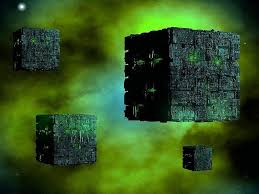
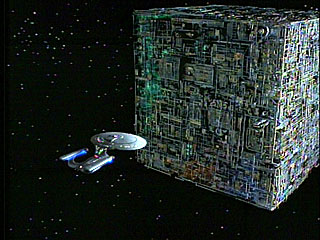
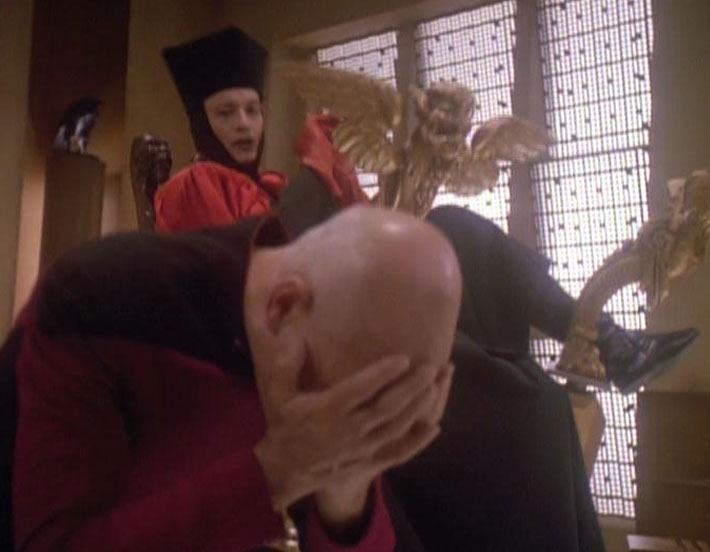
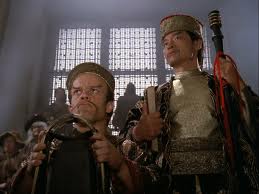
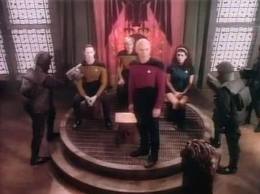
The first two pictures were of Borg Cubes from Star Trek. The next three pictures were from the Star Trek: The Next Generation episode Encounter at Farpoint (Episode 1, Season 1) - which I recommend watching (on Netflix) in order to see how much you agree with or disagree with the perspective of Q - traditionally a Star Trek villain. The court system pictured is also one from the Future, and could be the result of a society where the Internet and the Tribe have split.
Let's get started.
The Internet is Changing the Way We Think (The Guardian)
Notice that analysts, much like prophets, are often accurate in their ability to predict future events. More on this is a bit.
I cannot explain it any better than Carr did in this narrative. But I can add some proof. ATS has a back-search engine that any of you reading this can use in order to check out threads from prior to 2005 by date, which was when Facebook came out on college campuses, and also when cell phones started to become more dominant.
On Sunday, April 6, 2008 Facebook Chat started. This marks a gigantic event in the increase of networking. It is also an interesting milestone to use when searching through ATS backlogs.
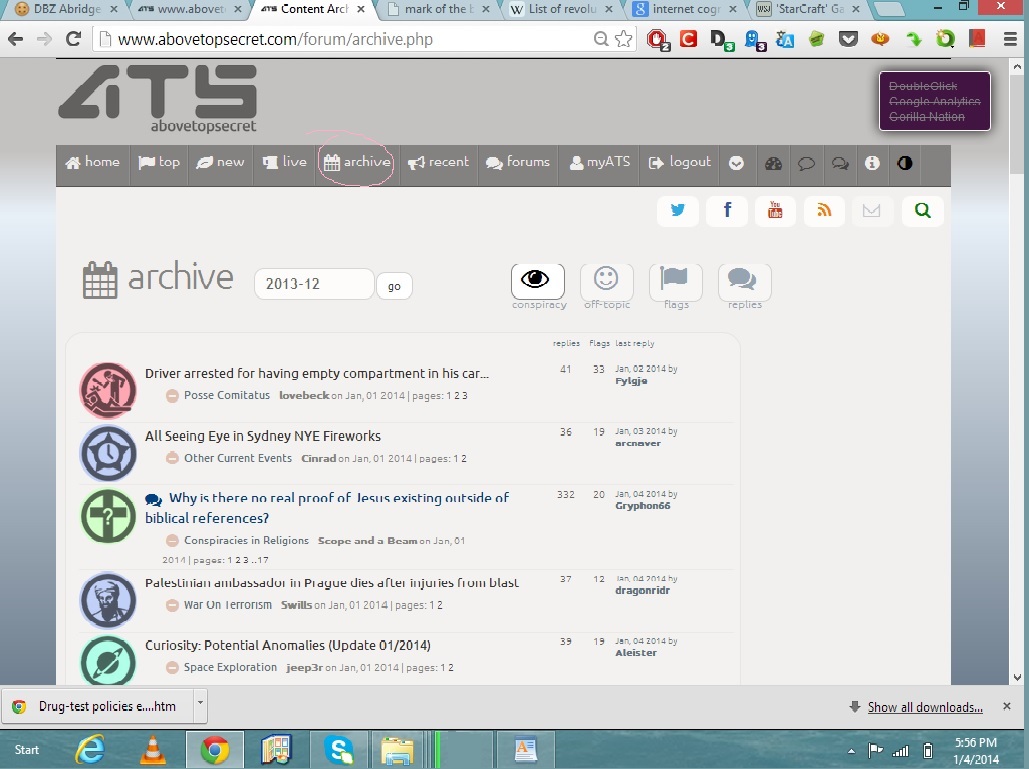
There is a picture to help you do it - I always have trouble finding it!
When you do, notice the difference in thinking processes of posters through their behavior, in fact, this is the only reason I'm having you do this -
Are their posts longer and more comprehensive or shorter and more likely to be one-liners not adding anything to the conversation now? How about in the past?
How much do the participants of the threads pay attention to each other in the past and present and integrate each others ideas into their own?
Has their ability to listen to each other increased or decreased? In what manners?
Has their intelligence increased or decreased? Can you identify specific intellectual traits that may have gone up or down?
Has hostility increased or decreased?
This is a way that all of you can personally participate in this thread in a hands-on manner and decide for yourselves through behavioral evidence right before your eyes - you can even look at your posts from the past and present if you wish, or of your friends to see - and figure out if you think the internet has caused a change in how people think and behave.
I can personally verify this statement. Let's look at some other studies (faster now, need to be quick) but that article by The Guardian is pure gold. I'll give you some more Gold.
Starcraft Gameplay Boosts Mental Flexibility: WSJ
Well let's leave you all there for now - I am running out of characters - and when we return (after the break, at some point in the future) I will give you some more links regarding how the Internet and technology can affect how you and your friends and others think! Now that I posted that article, Gold is slacking... we need Di
I am almost entirely convinced that Skyfloating is right about the Mark of the Beast being "www," and I am about to present a ton of evidence for how come. It will include historical evidence, behavioral evidence, psychological evidence, and even more prophetic evidence - but from a different source than expected - prophecies about what life is like after 2030, which almost (possibly always) state that we have actually returned to a less technological state than the one we are currently in, and this tone is even noted by Nostradamus, who was aware that there would be a shift.
If you look at the historical context, the internet, especially with smart phones and tablets (which mean that people are constantly networked with each other, so they represent the Epitome of the previous generation of laptops and desktops) and Google Glass (same) is a major change in the way people think, behave and such.
I would like to point out that this is going to be a scientific post and not one where I'm judging internet users. What I am going to show is that the Internet is going to come, and then, contrary to popular belief, it is going to be rejected by society - if anything, it makes the Mark of the Beast story more interesting - a story about a technological revolution, where people were free to choose whether or not to participate the whole time, and how technocrats miscalculated how humans think -
Until eventually, the technology-wielders of Google Glass and Smart Phones are overthrown by a younger generation more interested in comprehensive thinking and altruism.
As a matter of fact, for me, I am usually completely a moderate - I will entirely support one perspective one day, and another the next - so what does all of this say about the future of the Internet? Is it going to be rejected or integrated into society (a.k.a. humans will be assimilated into the www)? Can both societies live together simultaneously?





The first two pictures were of Borg Cubes from Star Trek. The next three pictures were from the Star Trek: The Next Generation episode Encounter at Farpoint (Episode 1, Season 1) - which I recommend watching (on Netflix) in order to see how much you agree with or disagree with the perspective of Q - traditionally a Star Trek villain. The court system pictured is also one from the Future, and could be the result of a society where the Internet and the Tribe have split.
Let's get started.
The Internet is Changing the Way We Think (The Guardian)
American writer Nicholas Carr's claim that the internet is not only shaping our lives but physically altering our brains has sparked a lively and ongoing debate, says John Naughton. Below, a selection of writers and experts offer their opinion
Every 50 years or so, American magazine the Atlantic lobs an intellectual grenade into our culture. In the summer of 1945, for example, it published an essay by the Massachusetts Institute of Technology (MIT) engineer Vannevar Bush entitled "As We May Think". It turned out to be the blueprint for what eventually emerged as the world wide web. Two summers ago, the Atlantic published an essay by Nicholas Carr, one of the blogosphere's most prominent (and thoughtful) contrarians, under the headline "Is Google Making Us Stupid?".
Notice that analysts, much like prophets, are often accurate in their ability to predict future events. More on this is a bit.
"Over the past few years," Carr wrote, "I've had an uncomfortable sense that someone, or something, has been tinkering with my brain, remapping the neural circuitry, reprogramming the memory. My mind isn't going – so far as I can tell – but it's changing. I'm not thinking the way I used to think. I can feel it most strongly when I'm reading. Immersing myself in a book or a lengthy article used to be easy. My mind would get caught up in the narrative or the turns of the argument and I'd spend hours strolling through long stretches of prose. That's rarely the case anymore. Now my concentration often starts to drift after two or three pages. I get fidgety, lose the thread, begin looking for something else to do. I feel as if I'm always dragging my wayward brain back to the text. The deep reading that used to come naturally has become a struggle."
The title of the essay is misleading, because Carr's target was not really the world's leading search engine, but the impact that ubiquitous, always-on networking is having on our cognitive processes.
I cannot explain it any better than Carr did in this narrative. But I can add some proof. ATS has a back-search engine that any of you reading this can use in order to check out threads from prior to 2005 by date, which was when Facebook came out on college campuses, and also when cell phones started to become more dominant.
On Sunday, April 6, 2008 Facebook Chat started. This marks a gigantic event in the increase of networking. It is also an interesting milestone to use when searching through ATS backlogs.

There is a picture to help you do it - I always have trouble finding it!
When you do, notice the difference in thinking processes of posters through their behavior, in fact, this is the only reason I'm having you do this -
Are their posts longer and more comprehensive or shorter and more likely to be one-liners not adding anything to the conversation now? How about in the past?
How much do the participants of the threads pay attention to each other in the past and present and integrate each others ideas into their own?
Has their ability to listen to each other increased or decreased? In what manners?
Has their intelligence increased or decreased? Can you identify specific intellectual traits that may have gone up or down?
Has hostility increased or decreased?
This is a way that all of you can personally participate in this thread in a hands-on manner and decide for yourselves through behavioral evidence right before your eyes - you can even look at your posts from the past and present if you wish, or of your friends to see - and figure out if you think the internet has caused a change in how people think and behave.
Carr argues that modern neuroscience, which has revealed the "plasticity" of the human brain, shows that our habitual practices can actually change our neuronal structures.
I can personally verify this statement. Let's look at some other studies (faster now, need to be quick) but that article by The Guardian is pure gold. I'll give you some more Gold.
Starcraft Gameplay Boosts Mental Flexibility: WSJ
Well let's leave you all there for now - I am running out of characters - and when we return (after the break, at some point in the future) I will give you some more links regarding how the Internet and technology can affect how you and your friends and others think! Now that I posted that article, Gold is slacking... we need Di
edit on 04pmSat, 04 Jan 2014 20:15:56 -0600kbpmkAmerica/Chicago by darkbake because: (no reason
given)
I just brisked over this post for now, but you present some interesting theories that I will definitely scrutinize a bit better later. I also have a
somewhat related idea, but unfortunately have not been able to post it. this site can be very annoying. for now I will flag, hopefully later when I
can read it properly there will be some response from the ATS community. has anyone considered the possibility of mind reading/control through certain
elements? as always, the rabbit hole goes deeper. usually when someone starts using star trek as a source I become one of those skeptics we all love.
sure,
edit on 10-1-2014 by vandalheart because: added something
"Over the past few years," Carr wrote, "I've had an uncomfortable sense that someone, or something, has been tinkering with my brain, remapping the neural circuitry, reprogramming the memory. My mind isn't going – so far as I can tell – but it's changing. I'm not thinking the way I used to think. I can feel it most strongly when I'm reading. Immersing myself in a book or a lengthy article used to be easy. My mind would get caught up in the narrative or the turns of the argument and I'd spend hours strolling through long stretches of prose. That's rarely the case anymore. Now my concentration often starts to drift after two or three pages. I get fidgety, lose the thread, begin looking for something else to do. I feel as if I'm always dragging my wayward brain back to the text. The deep reading that used to come naturally has become a struggle."
That completely holds true for me. Over the past few years, I've come to find that my attention span has gotten worse. It's hard to pay attention to things like I used to. Blame it on me getting older, but I think that you might be onto something here! It shows up a lot more when it comes to the internet. I could be immersed in an article online, and suddenly I find my mind drifting elsewhere. I wind up leaving the article halfway through to go to another website.
You're definitely on to something here.
S&F
I don't notice that my ability to pay attention to things has changed. However, I do notice that my ability to pay attention to in-depth stuff on the
Internet depends on my interest in it. If I'm not interested deeply or need to think a lot to puzzle my way through it, I need to actually print it
out to hard copy because there is something about staring at a computer/electronic screen that sort of turns me off. I think it's eye strain.
But my job is proofreading so I am naturally trained/habituated to read and notice detail. So, for the most part, I don't tend to skim or skip through things. If I made a habit of that, it would kill me professionally.
I do admit that I find it far, far easier though to really read things in hard copy as either book or on paper.
But my job is proofreading so I am naturally trained/habituated to read and notice detail. So, for the most part, I don't tend to skim or skip through things. If I made a habit of that, it would kill me professionally.
I do admit that I find it far, far easier though to really read things in hard copy as either book or on paper.
Quyll
"Over the past few years," Carr wrote, "I've had an uncomfortable sense that someone, or something, has been tinkering with my brain, remapping the neural circuitry, reprogramming the memory. My mind isn't going – so far as I can tell – but it's changing. I'm not thinking the way I used to think. I can feel it most strongly when I'm reading. Immersing myself in a book or a lengthy article used to be easy. My mind would get caught up in the narrative or the turns of the argument and I'd spend hours strolling through long stretches of prose. That's rarely the case anymore. Now my concentration often starts to drift after two or three pages. I get fidgety, lose the thread, begin looking for something else to do. I feel as if I'm always dragging my wayward brain back to the text. The deep reading that used to come naturally has become a struggle."
That completely holds true for me. Over the past few years, I've come to find that my attention span has gotten worse. It's hard to pay attention to things like I used to. Blame it on me getting older, but I think that you might be onto something here! It shows up a lot more when it comes to the internet. I could be immersed in an article online, and suddenly I find my mind drifting elsewhere. I wind up leaving the article halfway through to go to another website.
You're definitely on to something here.
S&F
Does this happen with every day tasks too? like if theres something you want to do, you lose interest suddenly before making any real progress?
there is so much going on in the world, I think subconsciously your brain is trying to take it all in.. It has the capacity but not quite enough processing power. Interesting theory, mental reprogramming. I wouldnt be all that surprised tbh, but to what end would which force want to do this in the first place? And by what means? Who, Why and How?
I am not sure what you are trying to say, www.com is the mark of the Beast? You started talking about a bunch of things , but not really going in
depth. I haven't read Revelations in awhile, but didnt they say we would all have the mark of the beast to buy and sell or something. Maybe Barcode.
I was thinking of getting a barcode tattoo when I was 15 but I was in Arizona and too young. It's Saturday and I got a six pack and haven't been
paid in two weeks but its the weekend. :-) going to watch SNL tonight. Maybe all the problems of the Mark of the Beast can wait till tomorrow.
reply to post by letmeon
hebrew characters
check out the link, this particular image was also used when people decided that the Monster brand of energy drinks logo was the mark of the beast with all the young teens who were wearing caps/clothing with the logo on. interestingly the hebrew character that represents 6 supposedly also represents the letter 'w'
not sure how accurate this is, but this would mean 'www' could be interpreted as '666' but there isnt really a direct connection btween english and hebrew as far as I can tell. Maybe someone who is hebrew literate could elaborate?
hebrew characters
check out the link, this particular image was also used when people decided that the Monster brand of energy drinks logo was the mark of the beast with all the young teens who were wearing caps/clothing with the logo on. interestingly the hebrew character that represents 6 supposedly also represents the letter 'w'
not sure how accurate this is, but this would mean 'www' could be interpreted as '666' but there isnt really a direct connection btween english and hebrew as far as I can tell. Maybe someone who is hebrew literate could elaborate?
new topics
-
Happy Thanksgiving to ATS
General Chit Chat: 4 minutes ago -
Simple Thanksgiving
Food and Cooking: 6 hours ago -
Trump could make a peaceful American Revolution
US Political Madness: 9 hours ago -
Trump Presidential Transition Team will not use GSA or Government entities to come to DC
US Political Madness: 10 hours ago -
Mind Blowing Cave under someones land
Fragile Earth: 10 hours ago -
The Party of Peace - Trump Cabinet Picks Targeted with Death Threats
US Political Madness: 11 hours ago
top topics
-
V.P. Kamala Harris releases a video and nobody understands why
US Political Madness: 14 hours ago, 16 flags -
Mind Blowing Cave under someones land
Fragile Earth: 10 hours ago, 16 flags -
The Party of Peace - Trump Cabinet Picks Targeted with Death Threats
US Political Madness: 11 hours ago, 15 flags -
Trump could make a peaceful American Revolution
US Political Madness: 9 hours ago, 14 flags -
Trump Presidential Transition Team will not use GSA or Government entities to come to DC
US Political Madness: 10 hours ago, 13 flags -
Simple Thanksgiving
Food and Cooking: 6 hours ago, 13 flags -
Happy Thanksgiving to ATS
General Chit Chat: 4 minutes ago, 1 flags
active topics
-
Happy Thanksgiving to ATS
General Chit Chat • 0 • : whyamIhere -
Simple Thanksgiving
Food and Cooking • 26 • : Station27 -
Mind Blowing Cave under someones land
Fragile Earth • 16 • : RickyD -
The Party of Peace - Trump Cabinet Picks Targeted with Death Threats
US Political Madness • 27 • : DBCowboy -
President-Elect DONALD TRUMP's 2nd-Term Administration Takes Shape.
Political Ideology • 256 • : WeMustCare -
-@TH3WH17ERABB17- -Q- ---TIME TO SHOW THE WORLD--- -Part- --44--
Dissecting Disinformation • 3389 • : Crazierfox -
Trump Presidential Transition Team will not use GSA or Government entities to come to DC
US Political Madness • 11 • : WeMustCare -
I thought Trump was the existential threat?
World War Three • 113 • : WeMustCare -
Mood Music Part VI
Music • 3719 • : MRTrismegistus -
Tunnels of Terror: The Cryptid Connection The Why Files
Cryptozoology • 5 • : TheMisguidedAngel
7
